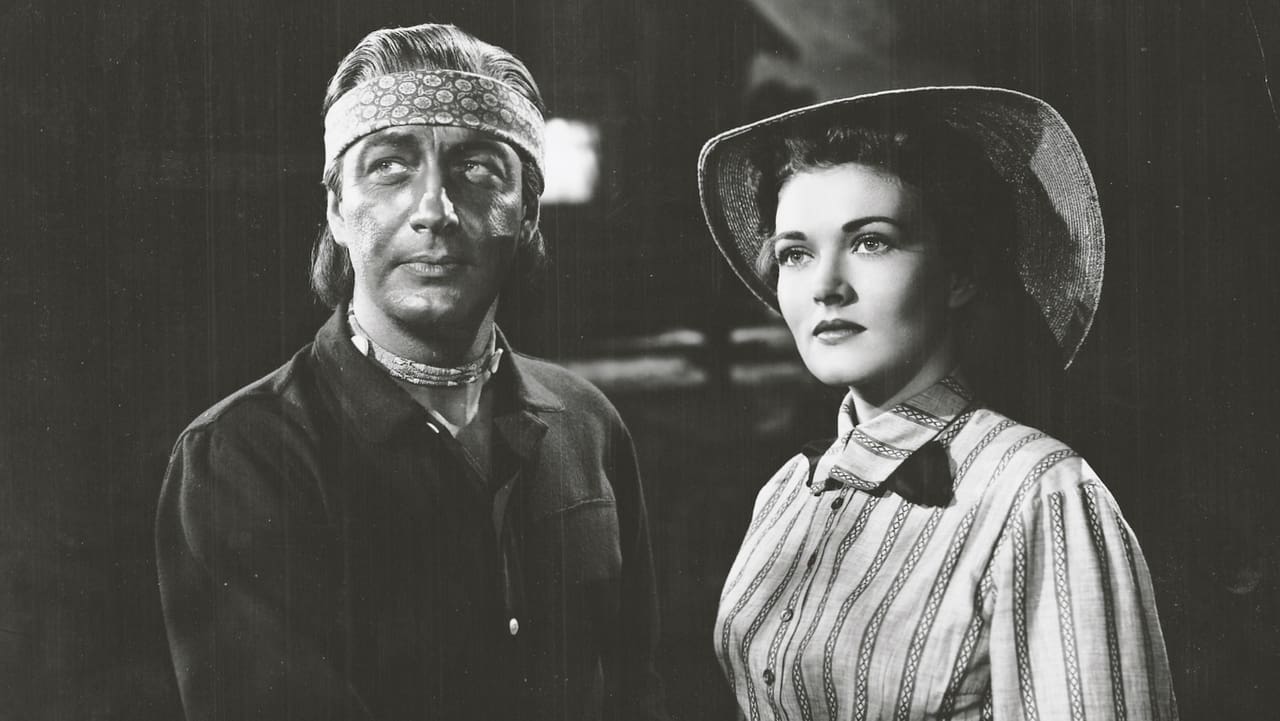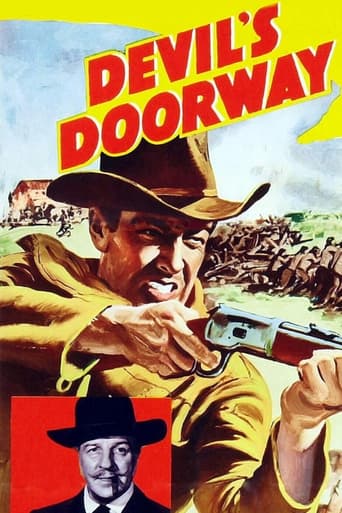Libramedi
Intense, gripping, stylish and poignant
Calum Hutton
It's a good bad... and worth a popcorn matinée. While it's easy to lament what could have been...
Lucia Ayala
It's simply great fun, a winsome film and an occasionally over-the-top luxury fantasy that never flags.
Alistair Olson
After playing with our expectations, this turns out to be a very different sort of film.
disinterested_spectator
"Devil's Doorway" is one of those movies about Indians that is not much fun, because the movie cares more about showing us the mistreatment of the Indians at the hands of white men than with entertaining us in the traditional manner, such as by having the Indians scalping, raping, and otherwise terrorizing white settlers.Robert Taylor in redface plays Broken Lance, a Shoshone Indian who has just arrived back home in Wyoming after service in the Civil War fighting for the North, where he won the Medal of Honor. In other words, this movie lays it on pretty thick. He intends to return to his peaceful ways as a free range cattle rancher, but he finds he is beset by a bunch of white people that intend to homestead on his land and raise sheep.This is an interesting twist. First, in most movies where there is a clash between men who want an open range for their cattle and families that want to homestead, it is the homesteaders that are good and the cattlemen that are evil, as in "Shane" (1953). Second, in most movies where sheepherders come into conflict with cattlemen, it is the sheepherders that are good and the cattlemen that are, once again, evil. Glenn Ford seems to show up in a lot of these movies. He is said by villain cattleman Rod Steiger to have the smell of sheep about him in "Jubal" (1956), is the title character in "The Sheepman" (1958), and intervenes as a pastor/gunslinger on the side of the good sheepherders (some of whom are Indians) against the bad cattlemen in "Heaven with a Gun" (1969). So, it is strange that the good guy in Devil's Doorway is a free range cattleman pitted again evil homesteading sheepherders. In fact, if this good guy had not been an Indian at a time when audiences were ready for movies about how Indians were good and white people were bad, the reversal might not have worked. Actually, not much works in this movie in any event. It is tedious and boring, as are all moralistic, preachy movies.As long as the movie was going to be about injustice toward Indians, I suppose the producers figured they might as well put in a word for gender equality as well, though they would hardly have termed it as such in 1950. And so, Lance's lawyer ends up being a woman, who goes by the name of Masters (Paula Raymond). Actually, being a pretty white woman, her real function is tantalize the audience with a little unconsummated miscegenation.When Lance finds out from Masters that the law does not allow Indians to homestead, he berates her for her faith in the law, as a kind of religion, saying that when you have the law, you don't have to worry about your conscience. It tells you what is right and wrong and no more thinking is required. He sarcastically says he wishes he had something like that.This is immediately followed by a scene in which a pubescent boy staggers and then crawls toward Lance's house. It turns out that, like all boys, he had to go into the mountains with only a knife, no food or water, go above the snow line wearing only moccasins and a loin cloth, and come back with the talons of an eagle within three days, or he is not a man. When Masters says that this practice is cruel, Lance justifies this custom, saying it is necessary so that the tribe knows whether the boy can be depended on to fight.Needless to say, a lot of boys probably die in making this attempt. I just knew Masters was going to say, "It looks as though I have faith in my laws, and you have faith in yours. Neither one of us has to bother about our conscience." And Masters could also have noted that white men are pretty good at fighting, and they don't do that to their children. Amazingly enough, she makes no such remarks. There is probably a kind of bigotry of low expectations at work here. White civilization is held to the higher standards of reason and justice, whereas there is a tendency to think of the customs of primitive peoples as too precious to subject to any serious criticism, the result being that the people who made this movie seem to be oblivious to the irony of these scenes, even though they put the one right after the other. Maybe they were being extra subtle, allowing us to have a laugh at Lance's expense, but it sure doesn't feel that way.Before the movie is out, the chief villain, played by Louis Calhern, who was the one that instigated the sheepherders' attempt to homestead, is killed off. And Lance is killed off too, in part to show that he is too manly to yield or compromise, and in part to keep him and Masters from exchanging bodily fluids across racial lines.
FightingWesterner
Civil War hero Robert Taylor returns to his people to Wyoming, only to find his valley ranch fair game for white homesteaders and himself, as an Indian, ineligible to claim his own land, leading to a violent confrontation.An unusual (and unusually grim) western, here the Indians are the cowboys and the villains sheep-farmers, the nemesis of cowboys everywhere. Although the ending is painfully obvious early on, getting there is compelling and heartbreaking, with the film perfectly capturing the anger and despair of not just native people, but anyone who plays by the rules and finds himself ground under the wheels of progress.Although not as well known as Anthony Mann's western collaborations with star James Stewart, this one also knows what buttons to push and delivers an action-packed climax, as well as good performances from Taylor and Paula Raymond, as a lady attorney who takes up his case.
Gross Ryder
This movie is in a remarkable contrast to Broken Arrow (released in the same year) insofar that in this movie one bad man (lawyer Verne Coolan) leads a whole community on the wrong path. It's not that the others are innocent sheep that can be led anywhere, but the racial, cultural prejudices are the preying grounds for the Devil to feed upon. And what better agent or instrument of the Devil than an evil lawyer, and an unjust law as the weapon? The hook or by crook manner in which the Native people in the new World were looted and stripped of all their rights is nowhere better exemplified than in this movie. Of course in this fictional (although in reality it was typical) case, the methodology is crude and overt because all that was needed was to push over one man who wanted to hold on to his land and to hold on to it even if he has to buy his own land if need be. But even that is denied to him because a new law framed by the government does not recognize an Indian as a valid citizen (and therefore cannot legally own any land even if bought by him). The far more sophisticated method was to simply pay a few dollars and bottles of whiskey to just one weak and drunkard Indian of the tribe, in return get a piece of paper signed by him selling all the land the tribe was living on, and loudly claim that they were now the owners of the land and the Indians had better push off or get killed by the 'volunteer army'. A further level of sophistication was required when the tribe was united under a strong Chief. In that case a treaty was made that promised protection to the Indians from further encroachment if the Indians gave up a large chunk of the land. Once that was accomplished, a slow process of gradual encroachment would begin, along with provocation upon provocation that would eventually elicit a retaliatory response. Once again a hue and cry would be raised that the Indians had broken the treaty. Naturally, the 'poor innocent settlers' were under grave threat to their lives and 'fully paid-up' property, and the 'poor innocent government' had no choice but to call in the 'highly disciplined' army to restore order in the land by wiping out the remaining Indians, and if some had still managed to survive, they would be confined to a 'reservation' where they would be slowly starved to death. Much later, even Hitler expressed his admiration for these sophisticated methods and advanced political science techniques used to find a 'solution' to the 'problem' of sub-humans. Such is the legacy of the 'conquest' and on such foundations 'the birth of The Nation' took place, The Nation that would claim to be the champion of 'human rights' and 'freedom of the individual' all over the world. Such ill-gotten power carries a terrible burden, and the telling of the story truthfully (in the general context) as this movie does, has substantial redeeming value, although what is done cannot be undone. Try to ignore it, try to forget it, and even that little window of redemption is shut for ever.
edwagreen
Despite a very good performance by Robert Taylor as a native Indian facing discrimination after his heroic war efforts during the Civil War, the film is a rather routine one.Louis Calhern plays the heavy here- an attorney full of prejudice who causes the tragedy to unfold in the Wyoming territory, after the civil war and the coming of the Homestead Act.It's usually a movie adage that never in the history of motion pictures has the cavalry ever been late. Too bad that those famous lines didn't work here.Spring Byington was probably ending her wonderful movie career dating back to the 1930's if not before. As the mother of the lawyer attempting to help the Taylor character, her part was rather wasted here. I guess that television would be more adventurous to her with the coming of "December Bride."Yes, we can identify this film with Wounded Knee and other outrages committed against minorities through the ages.

